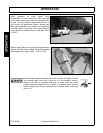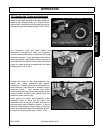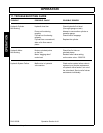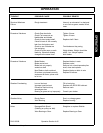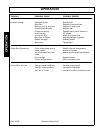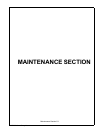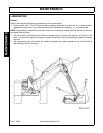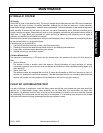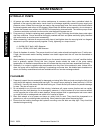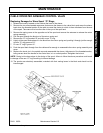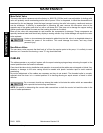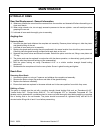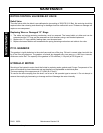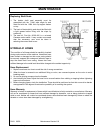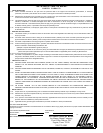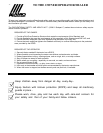
MAINTENANCE
PA91 03/09 Maintenance Section 5-4
© 2009 Alamo Group Inc.
MAINTENANCE
HYDRAULIC PUMPS
1. All pumps are rotate clockwise. No routine maintenance is necessary other than a periodical check for
tightness of the mounting bolts and a visual check for oil leakage especially around the pump supply and
pressure unions. Where two hose clips are used on the pump supply hose, their worm drive barrels should
be placed opposite each other at 180 degrees. When fitted with tandem pump assembly, do not attempt to
operate the harmed rams without the 5/8 BSP flail hoses being interconnected. The tandem pumps share
a common seal drain and both circuits must be intact before the pumps are run.
2. Pump serving is limited to replacing seals, gaskets and “O” rings. Servicing should take place under clean
dust free conditions. Pumps should be thoroughly washed and their end plates and body lightly identified
with scribe marks to ensure correct reassembly.
3. When reassembly, lubricate all components with clean oil and tighten down the securing bolts in a diagonal
sequence to pull the pumps squarely together. Finally, tightening to a torque load of:
4 - 5 KGM (30-37 lbs/ft.) M10 Setscrew
2-1/2 to 3 KGM (18-22 lbs/ft.) M8 Setscrew
4. Check for freedom of rotation. The pumps should turn freely under a hand load applied on a 6” radius arm.
If tight, the lobe seals and/or backing washers have been trapped and the unit must be dismantled to
rectify this.
5. After installation, the serviced pumps should be run for several minutes under a “no load” condition before
load is gradually applied. During this time, frequent checks should be made of the pump casing
temperature. An excessive temperature rise will indicate that the pump has been assembled incorrectly.
6. Generally, it is unwise to replace major components since they have to be matched in sets. Unless this is
done, the pump will be inefficient resulting in overheating and power loss. No detailed parts breakdown is
shown, but factory reconditioned units are available within our service exchange scheme.
FLAILHEAD
1. Frequently inspect the rotor assembly for damaged or missing flails. Bolts and nuts securing the flails to the
rotor should be regularly checked and kept tight. The correct torque setting for these locknuts is 135 Nm
(100 lbs/ft.). Use only the correct flail bolt and locking nut. Check the flail pivot bushes for possible damage
or wear. They do not require oil.
2. Do not attempt to run the rotor with flails missing. Imbalance will cause severe vibration and can rapidly
damage the rotor shaft bearings. As an emergency measure, if a flail is broken off or lost, remove another
on the opposite site of the rotor to retain balance. Always replace flails in opposite pairs and never match
up a new flail with a resharpened one which will of course be lighter.
3. Blunt flails absorb a lot of power and leave an untidy finish to work. They should be sharpened on a
grindstone or with a portable grinder periodically. Wear protective gear when sharpening flails.
4. Ensure that the bearing housings and hydraulic mounting nuts and bolts are kept tight. They should be
checked during servicing.



